Consumer Behaviour and Insights: Hospitality Industry Report
VerifiedAdded on 2022/12/28
|10
|2703
|61
Report
AI Summary
This report provides an in-depth analysis of consumer behavior and insights within the hospitality industry, focusing on the factors influencing consumer decision-making and attitudes. It examines the stages of the consumer decision-making process, including need recognition, information research, evaluation of alternatives, purchase decisions, and post-purchase behavior. The report highlights the importance of mapping the purchase path and understanding consumer perspectives, including economic, passive, cognitive, and emotional views. It contrasts B2B and B2C approaches in hospitality, explores various market research methods, and analyzes how marketers influence consumer behavior at different stages. The report also discusses consumer decision-making models and their impact on hospitality strategies, using Marriott International as a case study. The analysis covers the importance of consumer insights for enhancing operations, marketing strategies, and achieving business objectives.
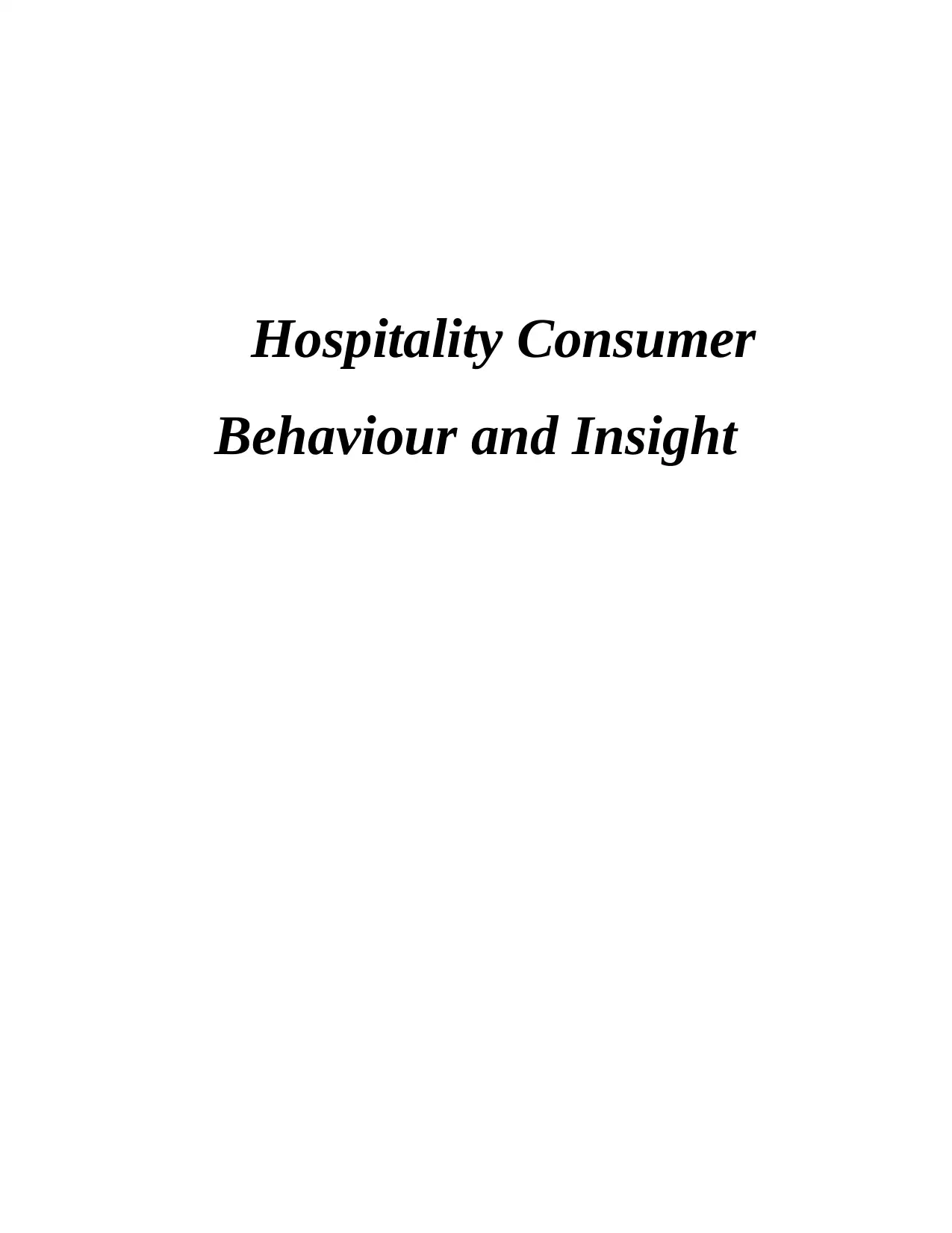
Hospitality Consumer
Behaviour and Insight
Behaviour and Insight
Paraphrase This Document
Need a fresh take? Get an instant paraphrase of this document with our AI Paraphraser
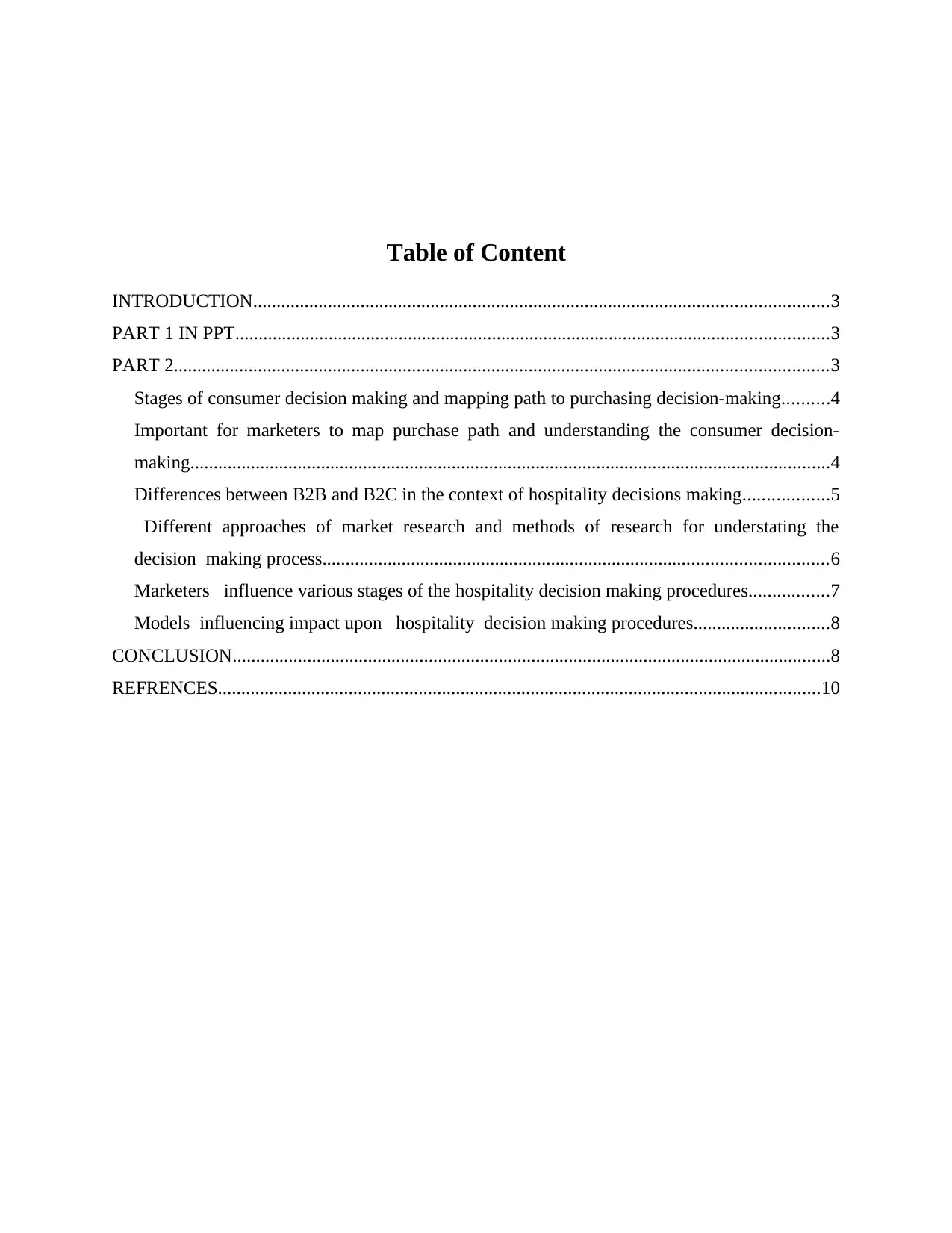
Table of Content
INTRODUCTION...........................................................................................................................3
PART 1 IN PPT...............................................................................................................................3
PART 2............................................................................................................................................3
Stages of consumer decision making and mapping path to purchasing decision-making..........4
Important for marketers to map purchase path and understanding the consumer decision-
making.........................................................................................................................................4
Differences between B2B and B2C in the context of hospitality decisions making..................5
Different approaches of market research and methods of research for understating the
decision making process............................................................................................................6
Marketers influence various stages of the hospitality decision making procedures.................7
Models influencing impact upon hospitality decision making procedures.............................8
CONCLUSION................................................................................................................................8
REFRENCES.................................................................................................................................10
INTRODUCTION...........................................................................................................................3
PART 1 IN PPT...............................................................................................................................3
PART 2............................................................................................................................................3
Stages of consumer decision making and mapping path to purchasing decision-making..........4
Important for marketers to map purchase path and understanding the consumer decision-
making.........................................................................................................................................4
Differences between B2B and B2C in the context of hospitality decisions making..................5
Different approaches of market research and methods of research for understating the
decision making process............................................................................................................6
Marketers influence various stages of the hospitality decision making procedures.................7
Models influencing impact upon hospitality decision making procedures.............................8
CONCLUSION................................................................................................................................8
REFRENCES.................................................................................................................................10
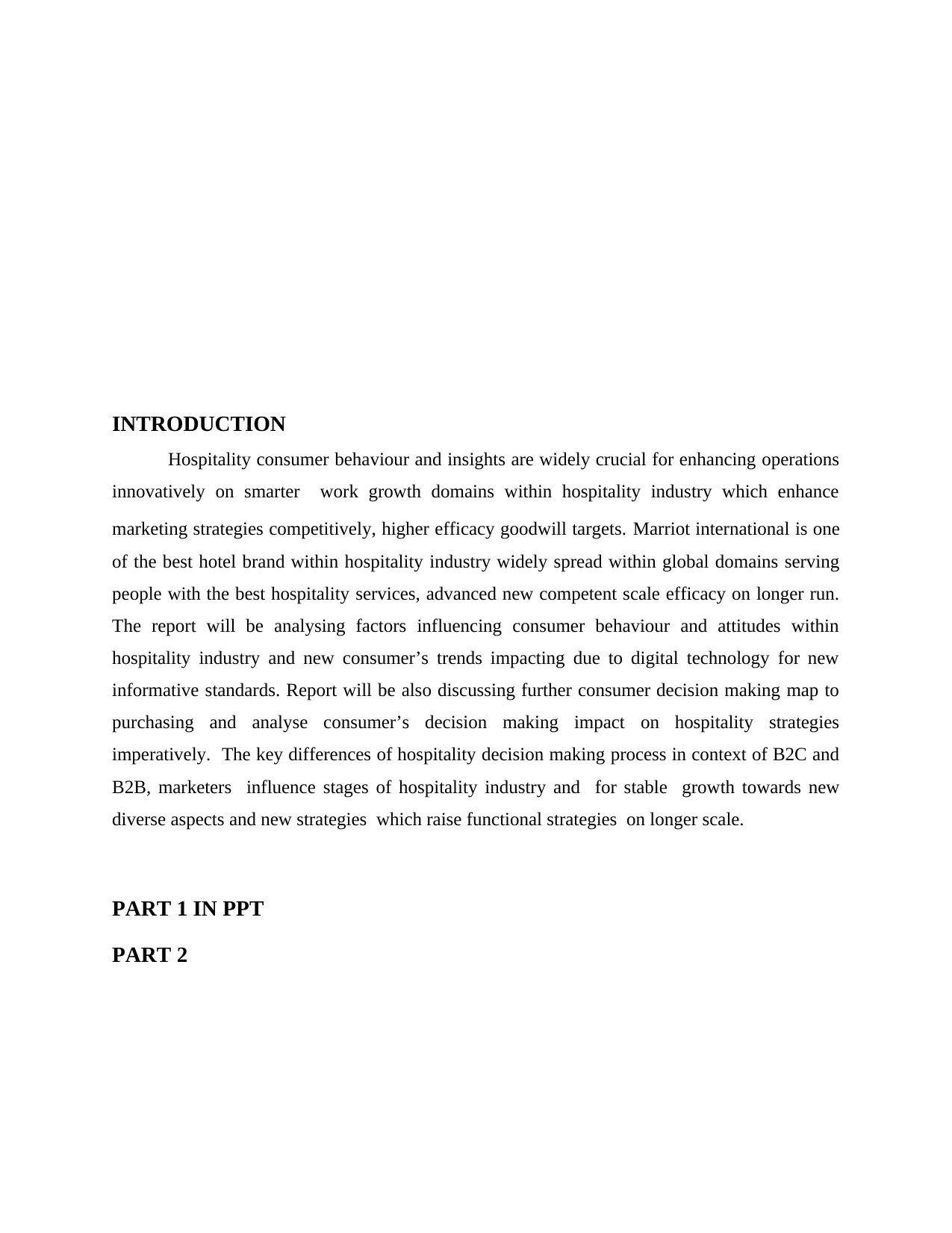
INTRODUCTION
Hospitality consumer behaviour and insights are widely crucial for enhancing operations
innovatively on smarter work growth domains within hospitality industry which enhance
marketing strategies competitively, higher efficacy goodwill targets. Marriot international is one
of the best hotel brand within hospitality industry widely spread within global domains serving
people with the best hospitality services, advanced new competent scale efficacy on longer run.
The report will be analysing factors influencing consumer behaviour and attitudes within
hospitality industry and new consumer’s trends impacting due to digital technology for new
informative standards. Report will be also discussing further consumer decision making map to
purchasing and analyse consumer’s decision making impact on hospitality strategies
imperatively. The key differences of hospitality decision making process in context of B2C and
B2B, marketers influence stages of hospitality industry and for stable growth towards new
diverse aspects and new strategies which raise functional strategies on longer scale.
PART 1 IN PPT
PART 2
Hospitality consumer behaviour and insights are widely crucial for enhancing operations
innovatively on smarter work growth domains within hospitality industry which enhance
marketing strategies competitively, higher efficacy goodwill targets. Marriot international is one
of the best hotel brand within hospitality industry widely spread within global domains serving
people with the best hospitality services, advanced new competent scale efficacy on longer run.
The report will be analysing factors influencing consumer behaviour and attitudes within
hospitality industry and new consumer’s trends impacting due to digital technology for new
informative standards. Report will be also discussing further consumer decision making map to
purchasing and analyse consumer’s decision making impact on hospitality strategies
imperatively. The key differences of hospitality decision making process in context of B2C and
B2B, marketers influence stages of hospitality industry and for stable growth towards new
diverse aspects and new strategies which raise functional strategies on longer scale.
PART 1 IN PPT
PART 2
⊘ This is a preview!⊘
Do you want full access?
Subscribe today to unlock all pages.

Trusted by 1+ million students worldwide
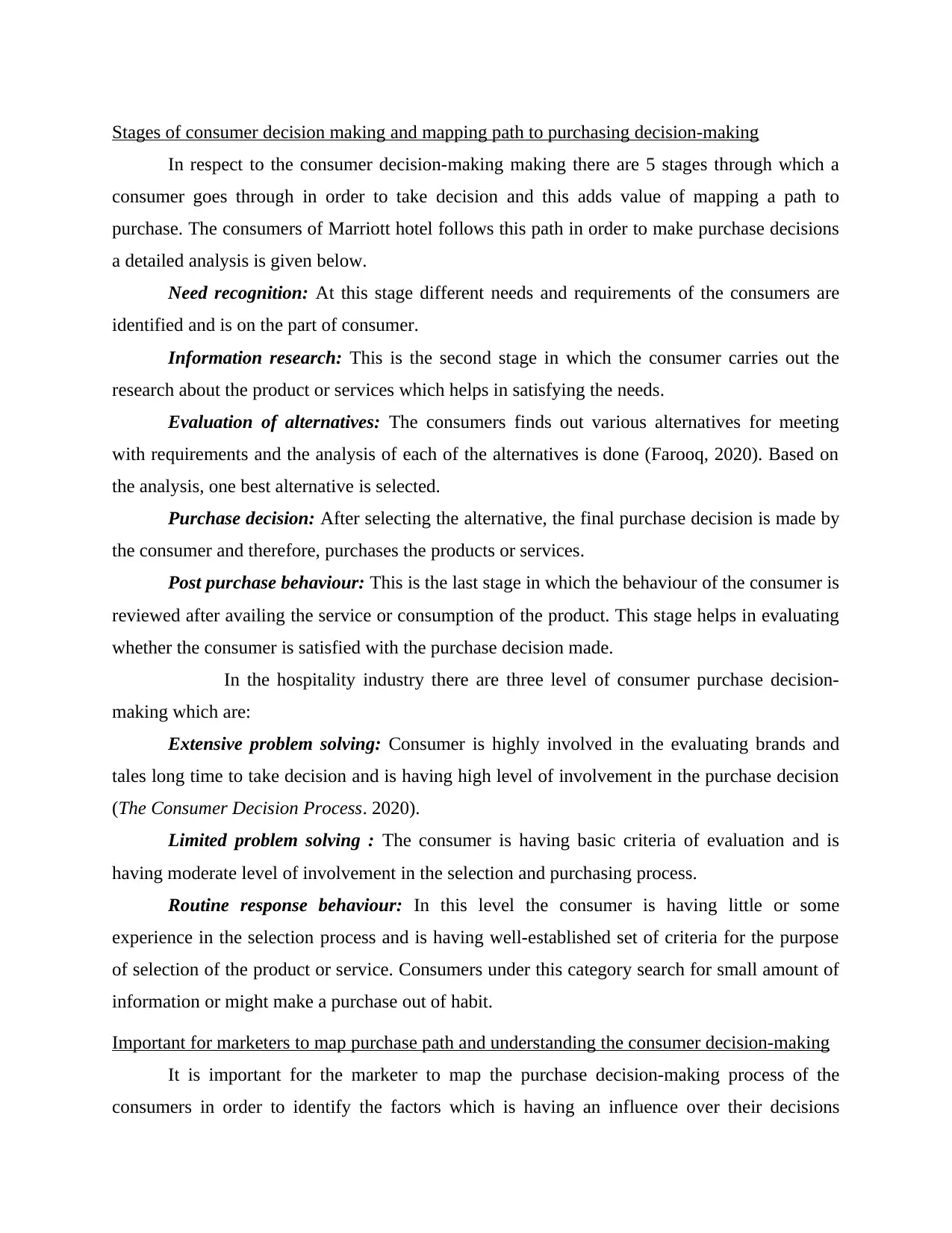
Stages of consumer decision making and mapping path to purchasing decision-making
In respect to the consumer decision-making making there are 5 stages through which a
consumer goes through in order to take decision and this adds value of mapping a path to
purchase. The consumers of Marriott hotel follows this path in order to make purchase decisions
a detailed analysis is given below.
Need recognition: At this stage different needs and requirements of the consumers are
identified and is on the part of consumer.
Information research: This is the second stage in which the consumer carries out the
research about the product or services which helps in satisfying the needs.
Evaluation of alternatives: The consumers finds out various alternatives for meeting
with requirements and the analysis of each of the alternatives is done (Farooq, 2020). Based on
the analysis, one best alternative is selected.
Purchase decision: After selecting the alternative, the final purchase decision is made by
the consumer and therefore, purchases the products or services.
Post purchase behaviour: This is the last stage in which the behaviour of the consumer is
reviewed after availing the service or consumption of the product. This stage helps in evaluating
whether the consumer is satisfied with the purchase decision made.
In the hospitality industry there are three level of consumer purchase decision-
making which are:
Extensive problem solving: Consumer is highly involved in the evaluating brands and
tales long time to take decision and is having high level of involvement in the purchase decision
(The Consumer Decision Process. 2020).
Limited problem solving : The consumer is having basic criteria of evaluation and is
having moderate level of involvement in the selection and purchasing process.
Routine response behaviour: In this level the consumer is having little or some
experience in the selection process and is having well-established set of criteria for the purpose
of selection of the product or service. Consumers under this category search for small amount of
information or might make a purchase out of habit.
Important for marketers to map purchase path and understanding the consumer decision-making
It is important for the marketer to map the purchase decision-making process of the
consumers in order to identify the factors which is having an influence over their decisions
In respect to the consumer decision-making making there are 5 stages through which a
consumer goes through in order to take decision and this adds value of mapping a path to
purchase. The consumers of Marriott hotel follows this path in order to make purchase decisions
a detailed analysis is given below.
Need recognition: At this stage different needs and requirements of the consumers are
identified and is on the part of consumer.
Information research: This is the second stage in which the consumer carries out the
research about the product or services which helps in satisfying the needs.
Evaluation of alternatives: The consumers finds out various alternatives for meeting
with requirements and the analysis of each of the alternatives is done (Farooq, 2020). Based on
the analysis, one best alternative is selected.
Purchase decision: After selecting the alternative, the final purchase decision is made by
the consumer and therefore, purchases the products or services.
Post purchase behaviour: This is the last stage in which the behaviour of the consumer is
reviewed after availing the service or consumption of the product. This stage helps in evaluating
whether the consumer is satisfied with the purchase decision made.
In the hospitality industry there are three level of consumer purchase decision-
making which are:
Extensive problem solving: Consumer is highly involved in the evaluating brands and
tales long time to take decision and is having high level of involvement in the purchase decision
(The Consumer Decision Process. 2020).
Limited problem solving : The consumer is having basic criteria of evaluation and is
having moderate level of involvement in the selection and purchasing process.
Routine response behaviour: In this level the consumer is having little or some
experience in the selection process and is having well-established set of criteria for the purpose
of selection of the product or service. Consumers under this category search for small amount of
information or might make a purchase out of habit.
Important for marketers to map purchase path and understanding the consumer decision-making
It is important for the marketer to map the purchase decision-making process of the
consumers in order to identify the factors which is having an influence over their decisions
Paraphrase This Document
Need a fresh take? Get an instant paraphrase of this document with our AI Paraphraser
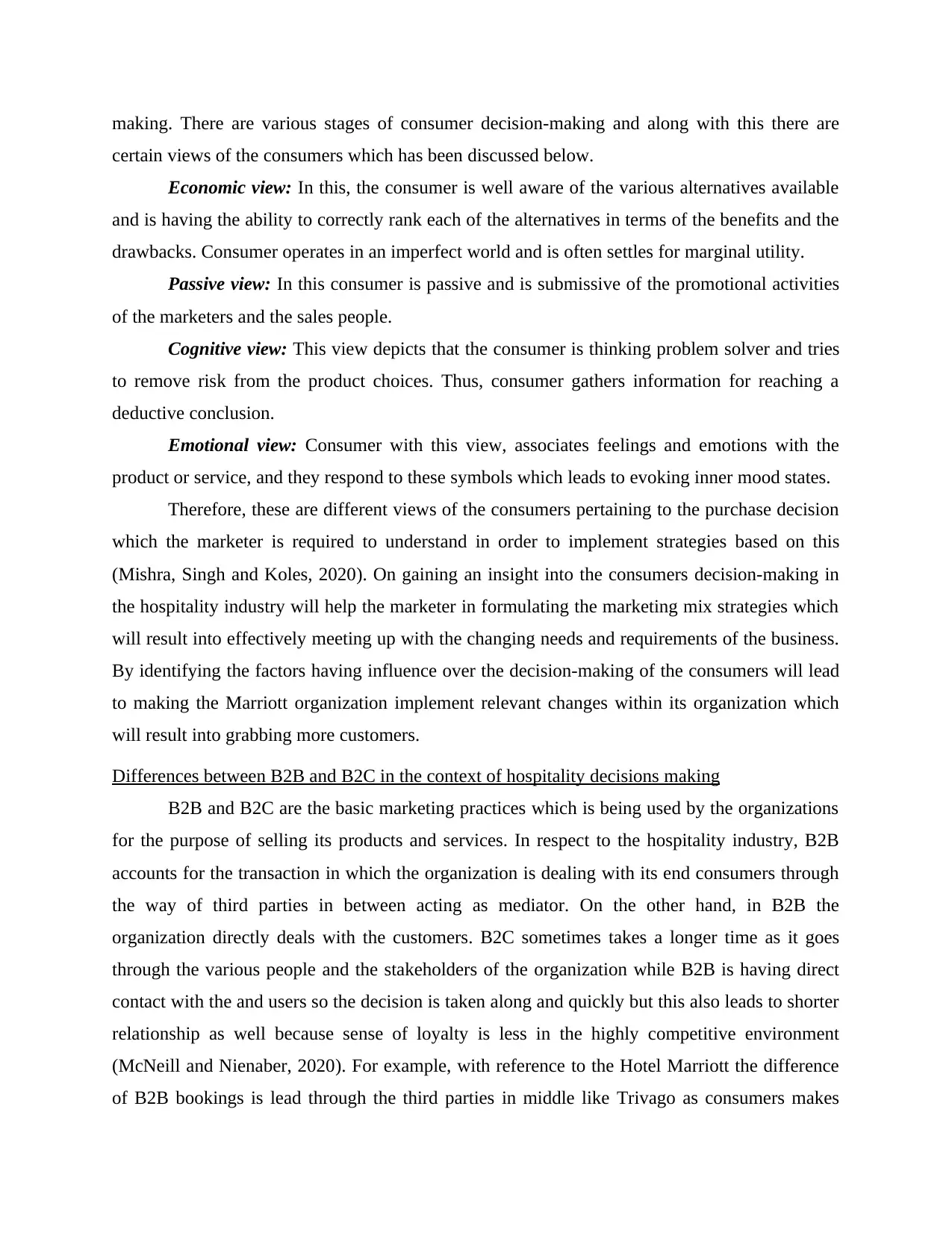
making. There are various stages of consumer decision-making and along with this there are
certain views of the consumers which has been discussed below.
Economic view: In this, the consumer is well aware of the various alternatives available
and is having the ability to correctly rank each of the alternatives in terms of the benefits and the
drawbacks. Consumer operates in an imperfect world and is often settles for marginal utility.
Passive view: In this consumer is passive and is submissive of the promotional activities
of the marketers and the sales people.
Cognitive view: This view depicts that the consumer is thinking problem solver and tries
to remove risk from the product choices. Thus, consumer gathers information for reaching a
deductive conclusion.
Emotional view: Consumer with this view, associates feelings and emotions with the
product or service, and they respond to these symbols which leads to evoking inner mood states.
Therefore, these are different views of the consumers pertaining to the purchase decision
which the marketer is required to understand in order to implement strategies based on this
(Mishra, Singh and Koles, 2020). On gaining an insight into the consumers decision-making in
the hospitality industry will help the marketer in formulating the marketing mix strategies which
will result into effectively meeting up with the changing needs and requirements of the business.
By identifying the factors having influence over the decision-making of the consumers will lead
to making the Marriott organization implement relevant changes within its organization which
will result into grabbing more customers.
Differences between B2B and B2C in the context of hospitality decisions making
B2B and B2C are the basic marketing practices which is being used by the organizations
for the purpose of selling its products and services. In respect to the hospitality industry, B2B
accounts for the transaction in which the organization is dealing with its end consumers through
the way of third parties in between acting as mediator. On the other hand, in B2B the
organization directly deals with the customers. B2C sometimes takes a longer time as it goes
through the various people and the stakeholders of the organization while B2B is having direct
contact with the and users so the decision is taken along and quickly but this also leads to shorter
relationship as well because sense of loyalty is less in the highly competitive environment
(McNeill and Nienaber, 2020). For example, with reference to the Hotel Marriott the difference
of B2B bookings is lead through the third parties in middle like Trivago as consumers makes
certain views of the consumers which has been discussed below.
Economic view: In this, the consumer is well aware of the various alternatives available
and is having the ability to correctly rank each of the alternatives in terms of the benefits and the
drawbacks. Consumer operates in an imperfect world and is often settles for marginal utility.
Passive view: In this consumer is passive and is submissive of the promotional activities
of the marketers and the sales people.
Cognitive view: This view depicts that the consumer is thinking problem solver and tries
to remove risk from the product choices. Thus, consumer gathers information for reaching a
deductive conclusion.
Emotional view: Consumer with this view, associates feelings and emotions with the
product or service, and they respond to these symbols which leads to evoking inner mood states.
Therefore, these are different views of the consumers pertaining to the purchase decision
which the marketer is required to understand in order to implement strategies based on this
(Mishra, Singh and Koles, 2020). On gaining an insight into the consumers decision-making in
the hospitality industry will help the marketer in formulating the marketing mix strategies which
will result into effectively meeting up with the changing needs and requirements of the business.
By identifying the factors having influence over the decision-making of the consumers will lead
to making the Marriott organization implement relevant changes within its organization which
will result into grabbing more customers.
Differences between B2B and B2C in the context of hospitality decisions making
B2B and B2C are the basic marketing practices which is being used by the organizations
for the purpose of selling its products and services. In respect to the hospitality industry, B2B
accounts for the transaction in which the organization is dealing with its end consumers through
the way of third parties in between acting as mediator. On the other hand, in B2B the
organization directly deals with the customers. B2C sometimes takes a longer time as it goes
through the various people and the stakeholders of the organization while B2B is having direct
contact with the and users so the decision is taken along and quickly but this also leads to shorter
relationship as well because sense of loyalty is less in the highly competitive environment
(McNeill and Nienaber, 2020). For example, with reference to the Hotel Marriott the difference
of B2B bookings is lead through the third parties in middle like Trivago as consumers makes
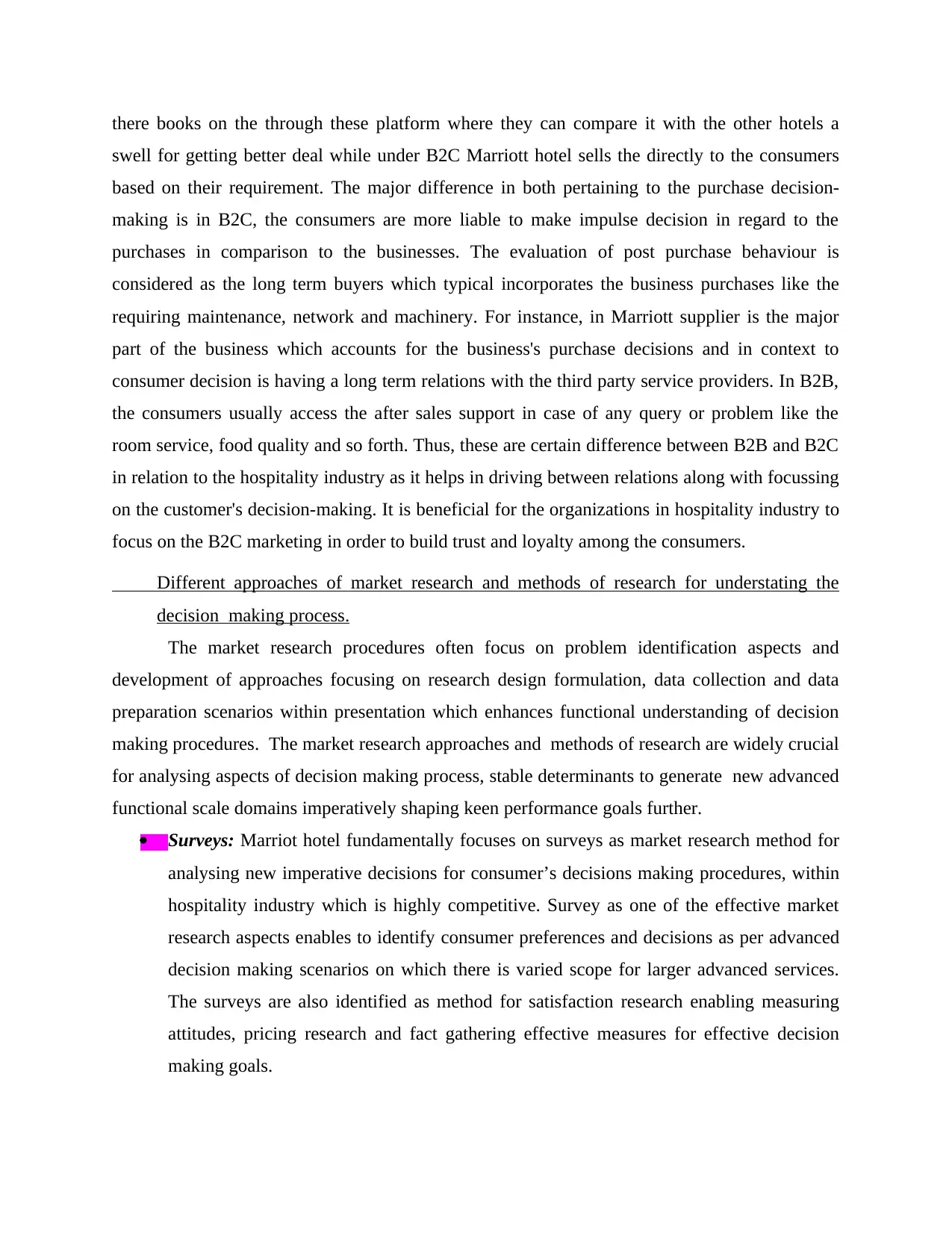
there books on the through these platform where they can compare it with the other hotels a
swell for getting better deal while under B2C Marriott hotel sells the directly to the consumers
based on their requirement. The major difference in both pertaining to the purchase decision-
making is in B2C, the consumers are more liable to make impulse decision in regard to the
purchases in comparison to the businesses. The evaluation of post purchase behaviour is
considered as the long term buyers which typical incorporates the business purchases like the
requiring maintenance, network and machinery. For instance, in Marriott supplier is the major
part of the business which accounts for the business's purchase decisions and in context to
consumer decision is having a long term relations with the third party service providers. In B2B,
the consumers usually access the after sales support in case of any query or problem like the
room service, food quality and so forth. Thus, these are certain difference between B2B and B2C
in relation to the hospitality industry as it helps in driving between relations along with focussing
on the customer's decision-making. It is beneficial for the organizations in hospitality industry to
focus on the B2C marketing in order to build trust and loyalty among the consumers.
Different approaches of market research and methods of research for understating the
decision making process.
The market research procedures often focus on problem identification aspects and
development of approaches focusing on research design formulation, data collection and data
preparation scenarios within presentation which enhances functional understanding of decision
making procedures. The market research approaches and methods of research are widely crucial
for analysing aspects of decision making process, stable determinants to generate new advanced
functional scale domains imperatively shaping keen performance goals further.
Surveys: Marriot hotel fundamentally focuses on surveys as market research method for
analysing new imperative decisions for consumer’s decisions making procedures, within
hospitality industry which is highly competitive. Survey as one of the effective market
research aspects enables to identify consumer preferences and decisions as per advanced
decision making scenarios on which there is varied scope for larger advanced services.
The surveys are also identified as method for satisfaction research enabling measuring
attitudes, pricing research and fact gathering effective measures for effective decision
making goals.
swell for getting better deal while under B2C Marriott hotel sells the directly to the consumers
based on their requirement. The major difference in both pertaining to the purchase decision-
making is in B2C, the consumers are more liable to make impulse decision in regard to the
purchases in comparison to the businesses. The evaluation of post purchase behaviour is
considered as the long term buyers which typical incorporates the business purchases like the
requiring maintenance, network and machinery. For instance, in Marriott supplier is the major
part of the business which accounts for the business's purchase decisions and in context to
consumer decision is having a long term relations with the third party service providers. In B2B,
the consumers usually access the after sales support in case of any query or problem like the
room service, food quality and so forth. Thus, these are certain difference between B2B and B2C
in relation to the hospitality industry as it helps in driving between relations along with focussing
on the customer's decision-making. It is beneficial for the organizations in hospitality industry to
focus on the B2C marketing in order to build trust and loyalty among the consumers.
Different approaches of market research and methods of research for understating the
decision making process.
The market research procedures often focus on problem identification aspects and
development of approaches focusing on research design formulation, data collection and data
preparation scenarios within presentation which enhances functional understanding of decision
making procedures. The market research approaches and methods of research are widely crucial
for analysing aspects of decision making process, stable determinants to generate new advanced
functional scale domains imperatively shaping keen performance goals further.
Surveys: Marriot hotel fundamentally focuses on surveys as market research method for
analysing new imperative decisions for consumer’s decisions making procedures, within
hospitality industry which is highly competitive. Survey as one of the effective market
research aspects enables to identify consumer preferences and decisions as per advanced
decision making scenarios on which there is varied scope for larger advanced services.
The surveys are also identified as method for satisfaction research enabling measuring
attitudes, pricing research and fact gathering effective measures for effective decision
making goals.
⊘ This is a preview!⊘
Do you want full access?
Subscribe today to unlock all pages.

Trusted by 1+ million students worldwide
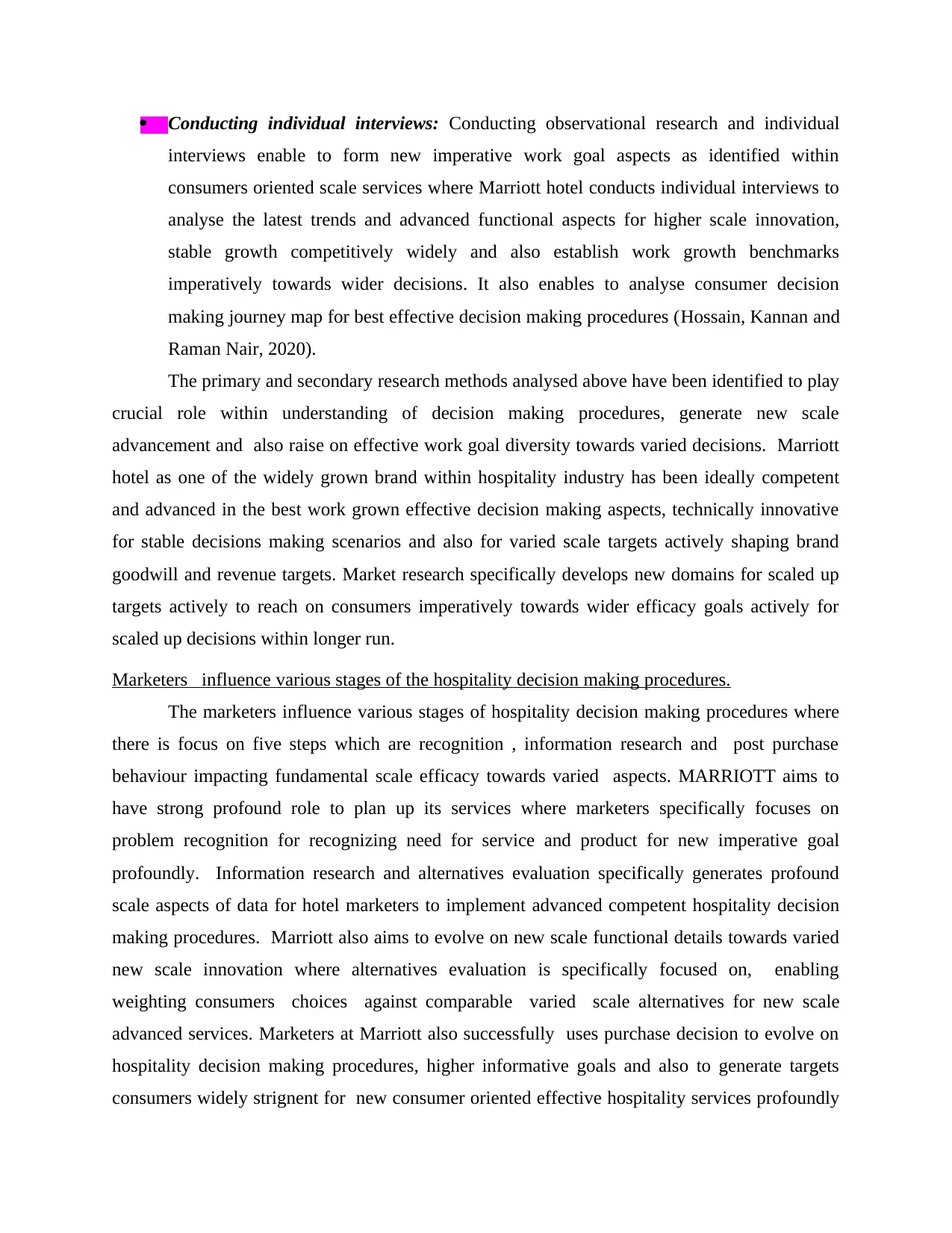
Conducting individual interviews: Conducting observational research and individual
interviews enable to form new imperative work goal aspects as identified within
consumers oriented scale services where Marriott hotel conducts individual interviews to
analyse the latest trends and advanced functional aspects for higher scale innovation,
stable growth competitively widely and also establish work growth benchmarks
imperatively towards wider decisions. It also enables to analyse consumer decision
making journey map for best effective decision making procedures (Hossain, Kannan and
Raman Nair, 2020).
The primary and secondary research methods analysed above have been identified to play
crucial role within understanding of decision making procedures, generate new scale
advancement and also raise on effective work goal diversity towards varied decisions. Marriott
hotel as one of the widely grown brand within hospitality industry has been ideally competent
and advanced in the best work grown effective decision making aspects, technically innovative
for stable decisions making scenarios and also for varied scale targets actively shaping brand
goodwill and revenue targets. Market research specifically develops new domains for scaled up
targets actively to reach on consumers imperatively towards wider efficacy goals actively for
scaled up decisions within longer run.
Marketers influence various stages of the hospitality decision making procedures.
The marketers influence various stages of hospitality decision making procedures where
there is focus on five steps which are recognition , information research and post purchase
behaviour impacting fundamental scale efficacy towards varied aspects. MARRIOTT aims to
have strong profound role to plan up its services where marketers specifically focuses on
problem recognition for recognizing need for service and product for new imperative goal
profoundly. Information research and alternatives evaluation specifically generates profound
scale aspects of data for hotel marketers to implement advanced competent hospitality decision
making procedures. Marriott also aims to evolve on new scale functional details towards varied
new scale innovation where alternatives evaluation is specifically focused on, enabling
weighting consumers choices against comparable varied scale alternatives for new scale
advanced services. Marketers at Marriott also successfully uses purchase decision to evolve on
hospitality decision making procedures, higher informative goals and also to generate targets
consumers widely strignent for new consumer oriented effective hospitality services profoundly
interviews enable to form new imperative work goal aspects as identified within
consumers oriented scale services where Marriott hotel conducts individual interviews to
analyse the latest trends and advanced functional aspects for higher scale innovation,
stable growth competitively widely and also establish work growth benchmarks
imperatively towards wider decisions. It also enables to analyse consumer decision
making journey map for best effective decision making procedures (Hossain, Kannan and
Raman Nair, 2020).
The primary and secondary research methods analysed above have been identified to play
crucial role within understanding of decision making procedures, generate new scale
advancement and also raise on effective work goal diversity towards varied decisions. Marriott
hotel as one of the widely grown brand within hospitality industry has been ideally competent
and advanced in the best work grown effective decision making aspects, technically innovative
for stable decisions making scenarios and also for varied scale targets actively shaping brand
goodwill and revenue targets. Market research specifically develops new domains for scaled up
targets actively to reach on consumers imperatively towards wider efficacy goals actively for
scaled up decisions within longer run.
Marketers influence various stages of the hospitality decision making procedures.
The marketers influence various stages of hospitality decision making procedures where
there is focus on five steps which are recognition , information research and post purchase
behaviour impacting fundamental scale efficacy towards varied aspects. MARRIOTT aims to
have strong profound role to plan up its services where marketers specifically focuses on
problem recognition for recognizing need for service and product for new imperative goal
profoundly. Information research and alternatives evaluation specifically generates profound
scale aspects of data for hotel marketers to implement advanced competent hospitality decision
making procedures. Marriott also aims to evolve on new scale functional details towards varied
new scale innovation where alternatives evaluation is specifically focused on, enabling
weighting consumers choices against comparable varied scale alternatives for new scale
advanced services. Marketers at Marriott also successfully uses purchase decision to evolve on
hospitality decision making procedures, higher informative goals and also to generate targets
consumers widely strignent for new consumer oriented effective hospitality services profoundly
Paraphrase This Document
Need a fresh take? Get an instant paraphrase of this document with our AI Paraphraser
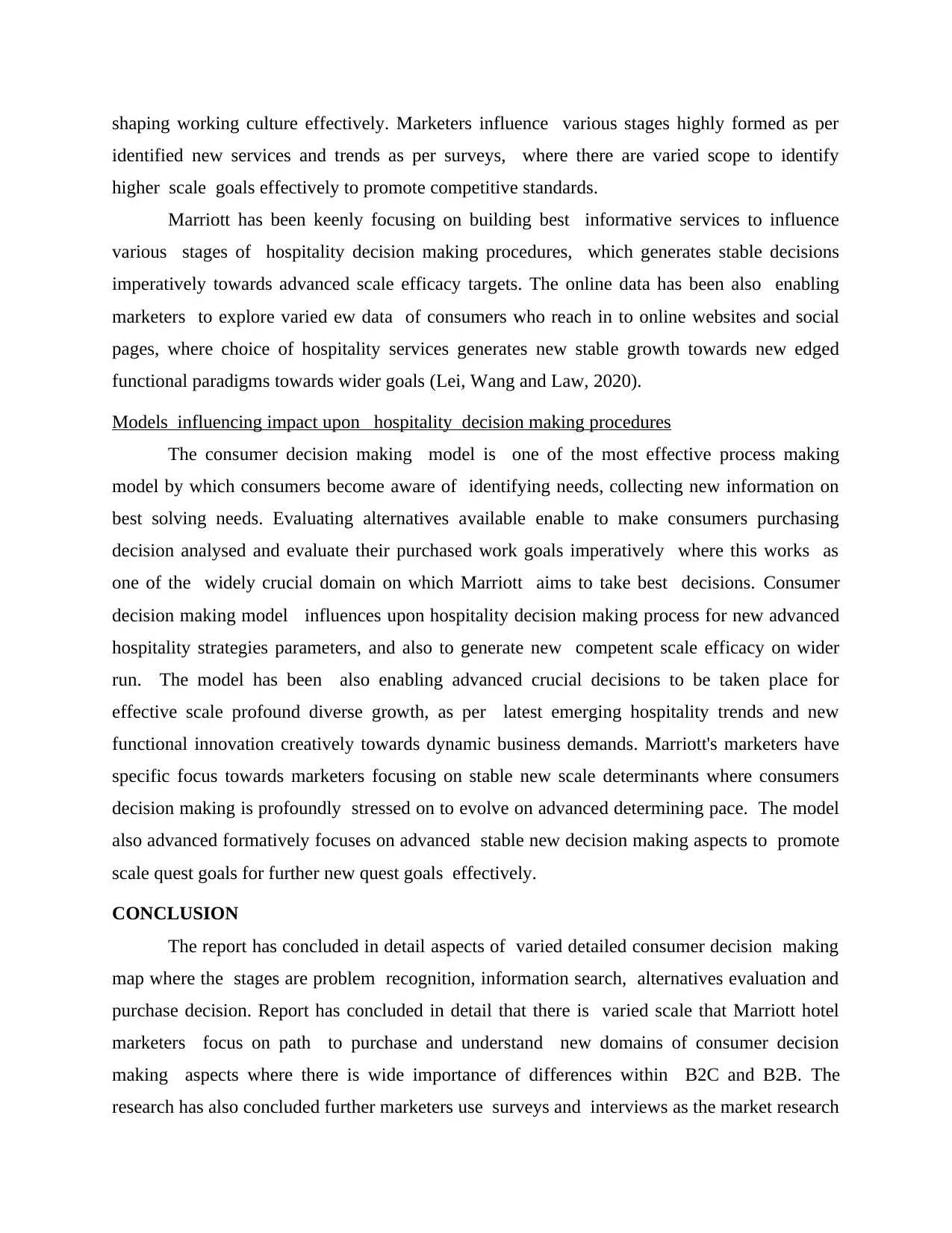
shaping working culture effectively. Marketers influence various stages highly formed as per
identified new services and trends as per surveys, where there are varied scope to identify
higher scale goals effectively to promote competitive standards.
Marriott has been keenly focusing on building best informative services to influence
various stages of hospitality decision making procedures, which generates stable decisions
imperatively towards advanced scale efficacy targets. The online data has been also enabling
marketers to explore varied ew data of consumers who reach in to online websites and social
pages, where choice of hospitality services generates new stable growth towards new edged
functional paradigms towards wider goals (Lei, Wang and Law, 2020).
Models influencing impact upon hospitality decision making procedures
The consumer decision making model is one of the most effective process making
model by which consumers become aware of identifying needs, collecting new information on
best solving needs. Evaluating alternatives available enable to make consumers purchasing
decision analysed and evaluate their purchased work goals imperatively where this works as
one of the widely crucial domain on which Marriott aims to take best decisions. Consumer
decision making model influences upon hospitality decision making process for new advanced
hospitality strategies parameters, and also to generate new competent scale efficacy on wider
run. The model has been also enabling advanced crucial decisions to be taken place for
effective scale profound diverse growth, as per latest emerging hospitality trends and new
functional innovation creatively towards dynamic business demands. Marriott's marketers have
specific focus towards marketers focusing on stable new scale determinants where consumers
decision making is profoundly stressed on to evolve on advanced determining pace. The model
also advanced formatively focuses on advanced stable new decision making aspects to promote
scale quest goals for further new quest goals effectively.
CONCLUSION
The report has concluded in detail aspects of varied detailed consumer decision making
map where the stages are problem recognition, information search, alternatives evaluation and
purchase decision. Report has concluded in detail that there is varied scale that Marriott hotel
marketers focus on path to purchase and understand new domains of consumer decision
making aspects where there is wide importance of differences within B2C and B2B. The
research has also concluded further marketers use surveys and interviews as the market research
identified new services and trends as per surveys, where there are varied scope to identify
higher scale goals effectively to promote competitive standards.
Marriott has been keenly focusing on building best informative services to influence
various stages of hospitality decision making procedures, which generates stable decisions
imperatively towards advanced scale efficacy targets. The online data has been also enabling
marketers to explore varied ew data of consumers who reach in to online websites and social
pages, where choice of hospitality services generates new stable growth towards new edged
functional paradigms towards wider goals (Lei, Wang and Law, 2020).
Models influencing impact upon hospitality decision making procedures
The consumer decision making model is one of the most effective process making
model by which consumers become aware of identifying needs, collecting new information on
best solving needs. Evaluating alternatives available enable to make consumers purchasing
decision analysed and evaluate their purchased work goals imperatively where this works as
one of the widely crucial domain on which Marriott aims to take best decisions. Consumer
decision making model influences upon hospitality decision making process for new advanced
hospitality strategies parameters, and also to generate new competent scale efficacy on wider
run. The model has been also enabling advanced crucial decisions to be taken place for
effective scale profound diverse growth, as per latest emerging hospitality trends and new
functional innovation creatively towards dynamic business demands. Marriott's marketers have
specific focus towards marketers focusing on stable new scale determinants where consumers
decision making is profoundly stressed on to evolve on advanced determining pace. The model
also advanced formatively focuses on advanced stable new decision making aspects to promote
scale quest goals for further new quest goals effectively.
CONCLUSION
The report has concluded in detail aspects of varied detailed consumer decision making
map where the stages are problem recognition, information search, alternatives evaluation and
purchase decision. Report has concluded in detail that there is varied scale that Marriott hotel
marketers focus on path to purchase and understand new domains of consumer decision
making aspects where there is wide importance of differences within B2C and B2B. The
research has also concluded further marketers use surveys and interviews as the market research
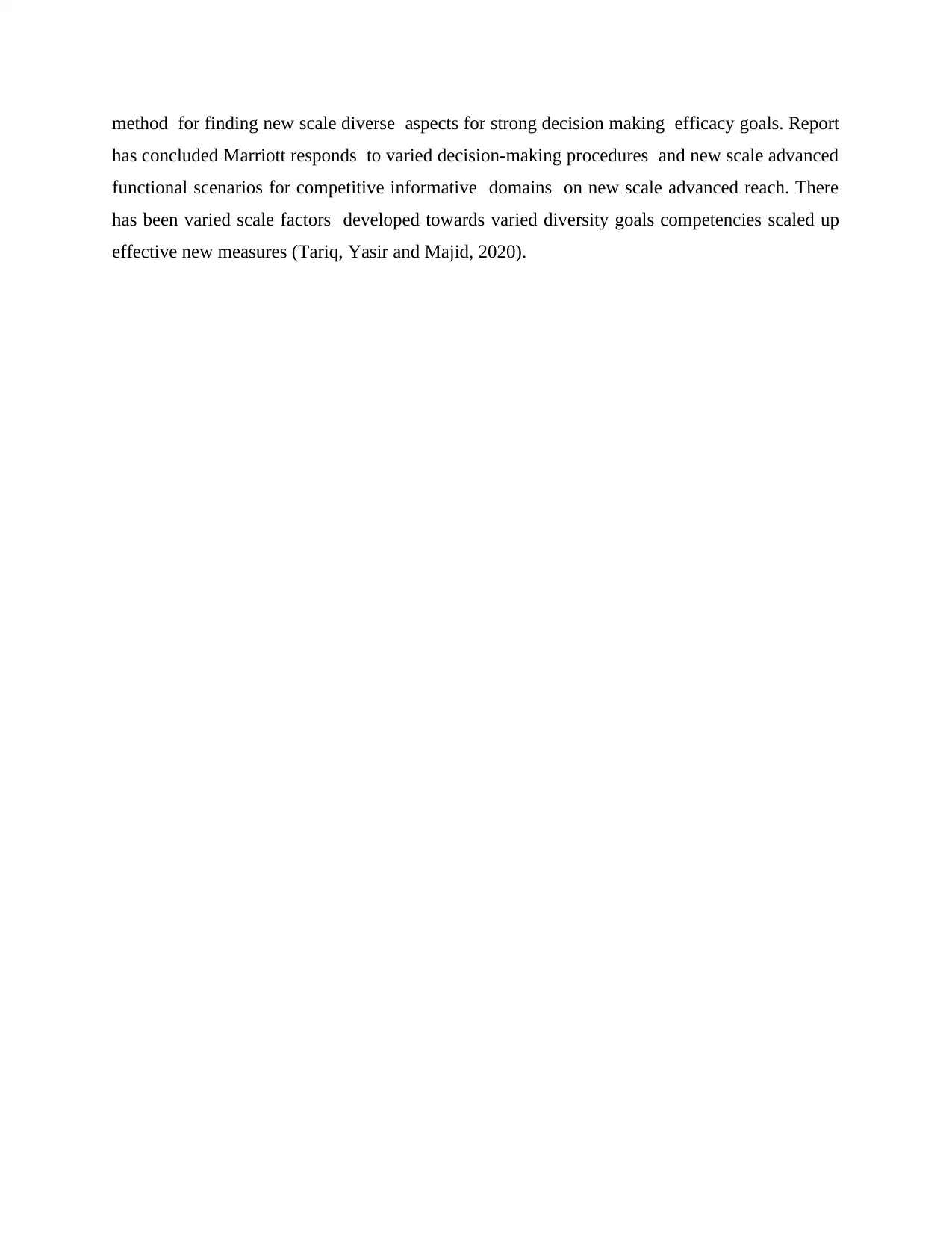
method for finding new scale diverse aspects for strong decision making efficacy goals. Report
has concluded Marriott responds to varied decision-making procedures and new scale advanced
functional scenarios for competitive informative domains on new scale advanced reach. There
has been varied scale factors developed towards varied diversity goals competencies scaled up
effective new measures (Tariq, Yasir and Majid, 2020).
has concluded Marriott responds to varied decision-making procedures and new scale advanced
functional scenarios for competitive informative domains on new scale advanced reach. There
has been varied scale factors developed towards varied diversity goals competencies scaled up
effective new measures (Tariq, Yasir and Majid, 2020).
⊘ This is a preview!⊘
Do you want full access?
Subscribe today to unlock all pages.

Trusted by 1+ million students worldwide
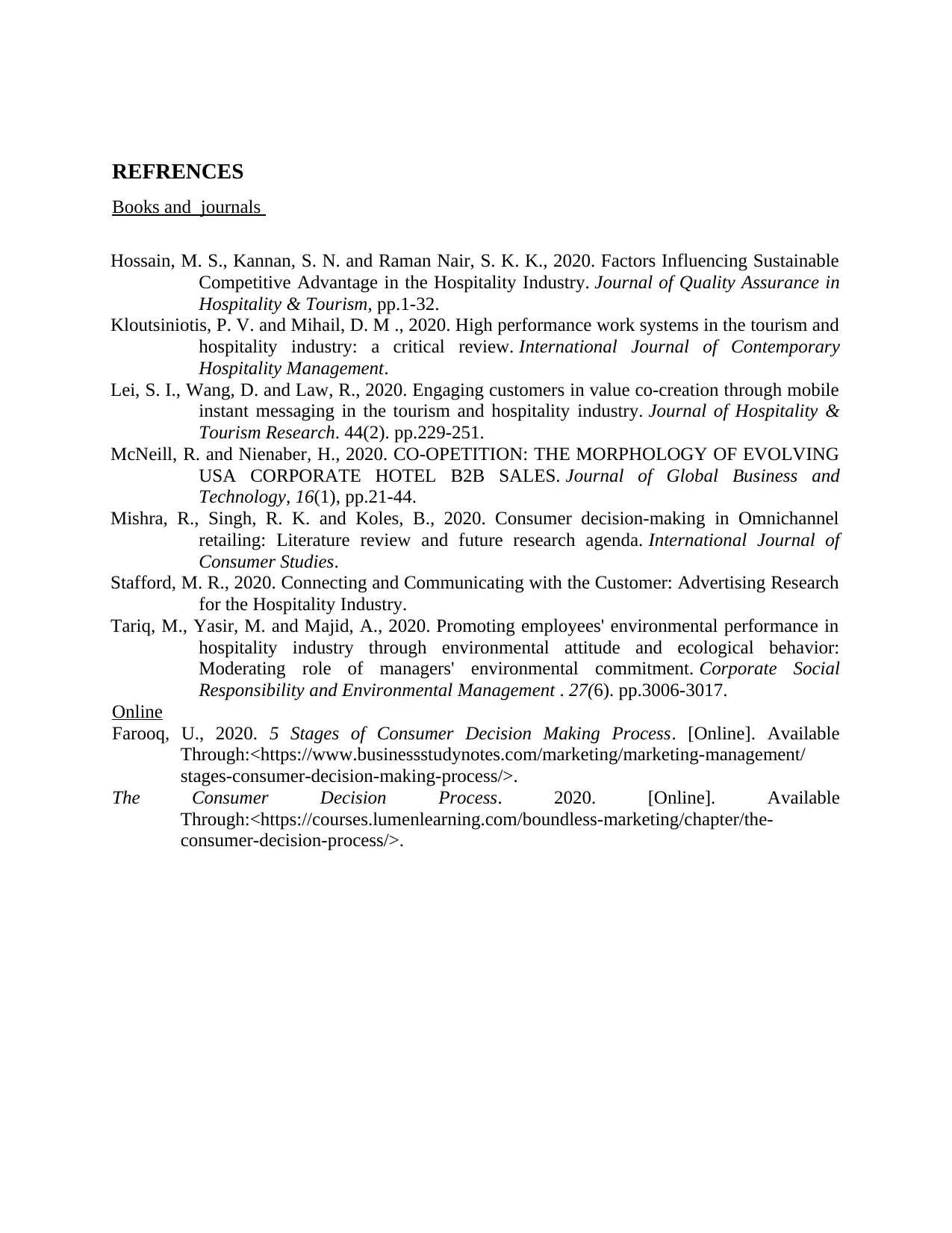
REFRENCES
Books and journals
Hossain, M. S., Kannan, S. N. and Raman Nair, S. K. K., 2020. Factors Influencing Sustainable
Competitive Advantage in the Hospitality Industry. Journal of Quality Assurance in
Hospitality & Tourism, pp.1-32.
Kloutsiniotis, P. V. and Mihail, D. M ., 2020. High performance work systems in the tourism and
hospitality industry: a critical review. International Journal of Contemporary
Hospitality Management.
Lei, S. I., Wang, D. and Law, R., 2020. Engaging customers in value co-creation through mobile
instant messaging in the tourism and hospitality industry. Journal of Hospitality &
Tourism Research. 44(2). pp.229-251.
McNeill, R. and Nienaber, H., 2020. CO-OPETITION: THE MORPHOLOGY OF EVOLVING
USA CORPORATE HOTEL B2B SALES. Journal of Global Business and
Technology, 16(1), pp.21-44.
Mishra, R., Singh, R. K. and Koles, B., 2020. Consumer decision‐making in Omnichannel
retailing: Literature review and future research agenda. International Journal of
Consumer Studies.
Stafford, M. R., 2020. Connecting and Communicating with the Customer: Advertising Research
for the Hospitality Industry.
Tariq, M., Yasir, M. and Majid, A., 2020. Promoting employees' environmental performance in
hospitality industry through environmental attitude and ecological behavior:
Moderating role of managers' environmental commitment. Corporate Social
Responsibility and Environmental Management . 27(6). pp.3006-3017.
Online
Farooq, U., 2020. 5 Stages of Consumer Decision Making Process. [Online]. Available
Through:<https://www.businessstudynotes.com/marketing/marketing-management/
stages-consumer-decision-making-process/>.
The Consumer Decision Process. 2020. [Online]. Available
Through:<https://courses.lumenlearning.com/boundless-marketing/chapter/the-
consumer-decision-process/>.
Books and journals
Hossain, M. S., Kannan, S. N. and Raman Nair, S. K. K., 2020. Factors Influencing Sustainable
Competitive Advantage in the Hospitality Industry. Journal of Quality Assurance in
Hospitality & Tourism, pp.1-32.
Kloutsiniotis, P. V. and Mihail, D. M ., 2020. High performance work systems in the tourism and
hospitality industry: a critical review. International Journal of Contemporary
Hospitality Management.
Lei, S. I., Wang, D. and Law, R., 2020. Engaging customers in value co-creation through mobile
instant messaging in the tourism and hospitality industry. Journal of Hospitality &
Tourism Research. 44(2). pp.229-251.
McNeill, R. and Nienaber, H., 2020. CO-OPETITION: THE MORPHOLOGY OF EVOLVING
USA CORPORATE HOTEL B2B SALES. Journal of Global Business and
Technology, 16(1), pp.21-44.
Mishra, R., Singh, R. K. and Koles, B., 2020. Consumer decision‐making in Omnichannel
retailing: Literature review and future research agenda. International Journal of
Consumer Studies.
Stafford, M. R., 2020. Connecting and Communicating with the Customer: Advertising Research
for the Hospitality Industry.
Tariq, M., Yasir, M. and Majid, A., 2020. Promoting employees' environmental performance in
hospitality industry through environmental attitude and ecological behavior:
Moderating role of managers' environmental commitment. Corporate Social
Responsibility and Environmental Management . 27(6). pp.3006-3017.
Online
Farooq, U., 2020. 5 Stages of Consumer Decision Making Process. [Online]. Available
Through:<https://www.businessstudynotes.com/marketing/marketing-management/
stages-consumer-decision-making-process/>.
The Consumer Decision Process. 2020. [Online]. Available
Through:<https://courses.lumenlearning.com/boundless-marketing/chapter/the-
consumer-decision-process/>.
1 out of 10
Related Documents
Your All-in-One AI-Powered Toolkit for Academic Success.
+13062052269
info@desklib.com
Available 24*7 on WhatsApp / Email
![[object Object]](/_next/static/media/star-bottom.7253800d.svg)
Unlock your academic potential
Copyright © 2020–2026 A2Z Services. All Rights Reserved. Developed and managed by ZUCOL.




